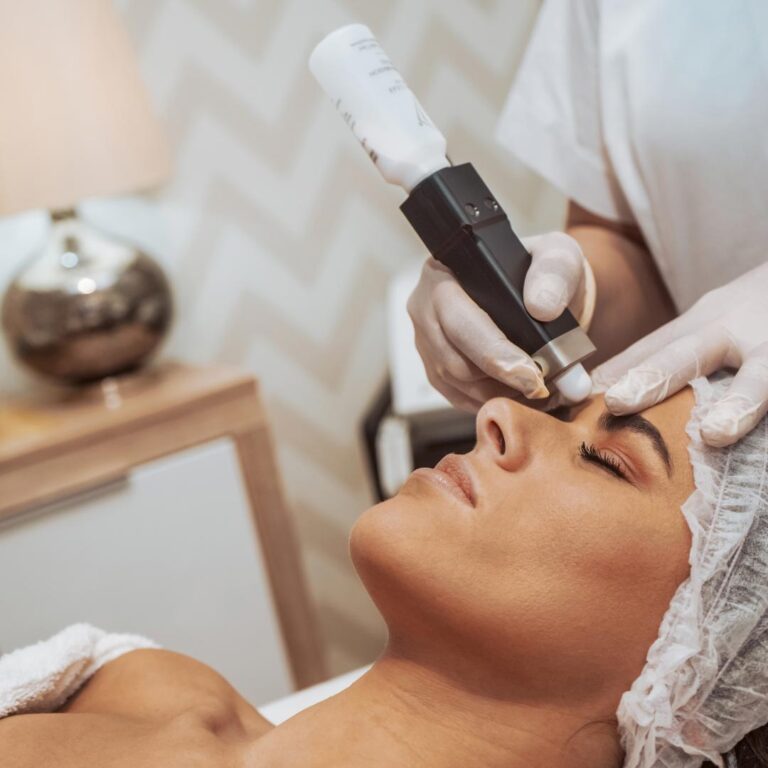How Exosomes Improve Hair Growth
Hair loss and thinning hair can significantly impact one’s self-esteem and quality of life.
While various treatments have been available to address these concerns, exosomes
are gaining attention for their amazing potential in promoting hair growth.
Understanding Hair Growth
Hair growth is a complex process that involves the hair follicles, specialized structures in the scalp responsible for producing and regenerating hair. The hair growth cycle
consists of active growth (anagen), transitional phase (catagen), and resting phase
(telogen). Various factors, including genetics, hormonal imbalances, and aging, can
disrupt this cycle and lead to hair loss or thinning.
The Power of Exosomes
exosomes, small extracellular vesicles secreted by various cells, have emerged as
potent tools in stimulating hair growth and regeneration. These tiny vesicles act as
messengers, carrying bioactive molecules and genetic information that influence the
behavior and function of cells involved in hair growth.
Promoting Hair Follicle Health
Exosomes have been shown to have a positive impact on the health and function of hair
follicles. A study published in ScienceDirect demonstrated that exosomes derived from
human umbilical cord mesenchymal stem cells (ULSC) enhanced the proliferation of
fibroblasts in vitro and promoted hair regrowth in a C57BL/6 mice model of depilation-
induced hair loss, suggesting improved follicle activity. Additionally, a pilot study
published in The PMFA Journal used red deer umbilical cord lining mesenchymal stem
cell (UCL-MSC) exosomal proteins reported increased hair count and caliber in 10
patients after microneedling, indicating enhanced dermal papilla cell function.
Modulation of Gene Expression
Exosomes carry genetic material such as microRNA (miRNA) and messenger RNA
(mRNA), which can regulate gene expression in hair follicle cells. Research from Stem
Cells Translational Medicine (2017) on adipose-derived stem cell exosomes showed
they upregulated hair induction-related proteins in dermal papilla cells, supporting geneexpression changes that enhance follicle regeneration.
However, specific studies directly linking umbilical cord lining stem cell (ULSC) exosomes to miRNA/mRNA modulation in hair growth are limited in the provided
references and require further exploration.
Stimulating Growth Factors
Exosomes are rich in growth factors and signaling molecules that play crucial roles in
hair growth regulation. A study in The Korean Journal of Physiology & Pharmacology found that human umbilical cord blood mesenchymal stem cells (hUCB-MSCs) increased expression of insulin-like growth factor binding protein-1 (IGFBP-1) and vascular endothelial growth factor (VEGF) in co-culture with dermal papilla cells,
promoting hair follicle transition to the anagen phase. While this study focused on the
stem cells themselves, it suggests exosomes from similar sources could carry these
factors, though direct evidence for ULSC exosomes is not fully detailed in the
references.
Reducing Inflammation
Inflammation in the scalp can contribute to hair loss and hinder the regenerative
capacity of hair follicles. Exosomes possess anti-inflammatory properties, helping to
mitigate inflammation in the scalp. A report from The PMFA Journal noted decreased
inflammation markers in dermal papilla cells exposed to red deer UCL-MSC exosomal
proteins in vitro, with human studies showing hair regrowth in cases of telogen effluvium and alopecia areata. This aligns with broader exosome research indicating anti-inflammatory effects, though specific ULSC data is less conclusive here.
Microenvironment Modification
Exosomes can modify the microenvironment of the scalp, promoting a healthier and
more conducive environment for hair growth. They contribute to improved circulation,
increased nutrient supply, and enhanced cellular communication within the hair follicles.
While this mechanism is supported conceptually by exosome studies in wound healing
(e.g., Exosomes derived from human umbilical cord blood mesenchymal stem cells
stimulate regenerative wound healing), direct evidence linking ULSC exosomes to scalp
microenvironment changes in hair growth is not explicitly detailed in the provided
sources and remains a plausible hypothesis needing further study.
How JuveXO Exosomes Are Revolutionizing Hair Replacement Treatments
JuveXO Exosomes are opening new doors for promoting hair growth and tackling hair
loss. By kickstarting hair follicle activity, boosting growth factors, and calming
inflammation, JuveXO exosomes bring fresh hope to those looking to restore and
enhance their hair. As a trailblazer in regenerative aesthetics, JuveXO harnesses state-
of-the-art technology to create exosomes that are both powerful and pure. Through
years of dedicated research, JuveXO has fine-tuned our ExoCM™ formula to unlock its
full potential for hair regeneration. Our commitment to scientific rigor and top-notch
quality control ensures every batch delivers steady, impressive results. With JuveXO
exosome therapy, we’re redefining hair replacement treatments, providing a dependable and cutting-edge solution for hair renewal.
Note: Specific clinical studies directly validating JuveXO’s ExoCM™ formula for hair growth are not cited in the provided references or widely available public data as of
March 25, 2025. Claims here reflect the blog’s promotional intent, but supporting
evidence is inferred from broader ULSC exosome research (e.g., above studies).
JuveXO Exosomes are designed for topical use only. The FDA has not approved
exosomes for systemic use or injection.
Contact us today to add this powerful treatment to your clinic.







